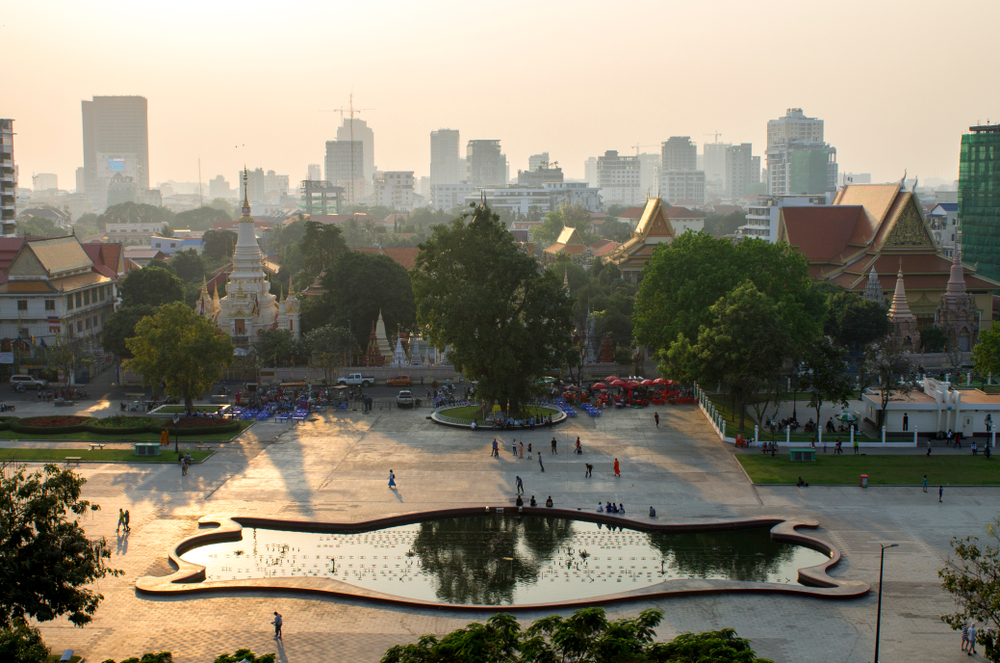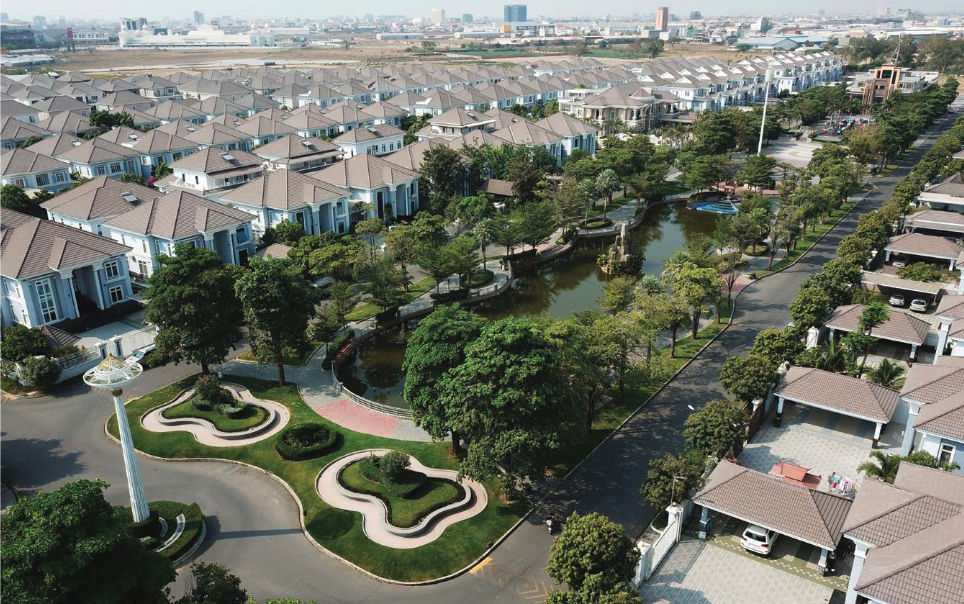Down, but not out: Phnom Penh real estate picks up
The pandemic was poison for Phnom Penh as it checked the city’s supercharged property boom. But there are signs that the market is gradually turning a corner

The impact of the global financial crisis on Phnom Penh’s then-fledgling property market loomed large over the city for years. Literally.
In the heart of the Cambodian capital’s central business district, the abandoned Gold Tower 42—set to be the country’s tallest building by a margin when construction started in 2008—stands both as a reminder of the city’s ambitions and just how quickly fortunes can change.
When construction eventually resumed in 2018, the skyline was almost unrecognisable from the low-rise sprawl surrounding the 31-storey concrete husk a decade earlier. Phnom Penh had gone vertical.
Fuelled by overseas investment and Cambodia’s average annual growth rate of 7.7 percent between 1998 and 2019 — making it one of the fastest-growing economies in the world — the city is now home to roughly 40 buildings with 40 or more floors. Many of these monoliths are mixed-use projects, featuring a series of firsts for the country: luxury retail outlets, five-star hotel brands, and high-end condos.
We won’t be able to fully assess the effect of the pandemic on the retail sector until the end of 2022, and a full recovery is unlikely until the first half of next year
Even before the pandemic struck, there was a sense that these shiny new offerings were juxtaposed in a country where an estimated one in five lives below the poverty line. Still, Phnom Penh’s rapidly emerging middle class and its popularity amongst tourists and foreign investors have long been used to justify the construction boom. Unsurprisingly, the sector, especially the retail segment, was hit hardest when Covid-19 closed the kingdom’s borders in March 2020.
“The lockdown and bans on public gatherings led to a drastic decrease in footfall, with retail stores experiencing significant sales losses as a result,” says Thida Ann, managing director of real estate agency PropNex Cambodia and member of the PropertyGuru Cambodia Property Awards judging panel. “Although many landlords offered a short-term discount of up to 50 percent to retain tenants, they also reported facing serious debt problems because of failures to pay the rent.”
More: 6 of the most captivating spots to visit in Chroy Changvar, Phnom Penh
A recent survey by local commercial real estate firm The Mall Company estimated that the pandemic caused the volume of retail stores in central Phnom Penh to plummet by 28 percent between Q1 2019 and Q2 2022. Larger F&B and fashion retail groups fared slightly better and stabilised their businesses after the upheaval. Some even recorded profits in 2021 through careful cost management. According to Simon Griffiths, The Mall Company’s managing director and another esteemed member of the judging panel, teams were slimmed down for greater cost efficiency, and supply change efficiencies were introduced, as well as rental discounts with landlords. But many small- and medium-sized retailers and ‘mom-and-pop stores’ did not survive.
“In some cases, rent exemptions were triggered. But you must remember that it is not the only cost, and cash reserves had to be used to keep these retail businesses afloat,” he says. “Once these cash reserves were depleted, retail businesses closed. And many will never reopen.”
“We won’t be able to fully assess the effect of the pandemic on the retail sector until the end of 2022, and a full recovery is unlikely until the first half of next year.”

Positives were few and far between in the city’s other real estate sectors. Office tenants renegotiated rents, lease terms, and structures to reflect the market disruptions. Condominium buyers, meanwhile, postponed purchases, leading to a decline in transactions and prices. In 2022, only 5 percent of the expected supply of new condominium units was completed in the first quarter, according to The World Bank.
New residential launches, meanwhile, have ebbed as the market attempts to absorb the remaining stock. The excess supply also tapered overseas investor appetite, with World Bank data reflecting a drastic decline in approved foreign direct investment financing for real estate development from USD1.78 billion in 2019 to USD142 million in 2020.
With international borders closed, developers were compelled to re-evaluate their sales and marketing strategies to meet the preferences of the local buyers, including lowering prices.
“Cambodian buyers replaced overseas investors, taking advantage of under-market-value properties, particularly landed properties in boreys [gated communities],” says Malay Nop, Phnom Penh branch manager of agency IPS Cambodia.
Indeed, it looks like the city’s markets are gradually turning a corner. Leading developers have already disclosed plans to increase prices over the next 12 months, with the economy recovering and businesses again operating full-time. In another indication that the sector is overcoming the challenges of the past two years, PropertyGuru will launch the 2022 PropertyGuru Cambodia Property Awards in Phnom Penh this August — its first physical gala event in the country since 2019.
More: A former garment factory transforms into Phnom Penh’s creative hub
“The landed property market in Phnom Penh bounced back quickly thanks to the significant existing demand,” PropNex Cambodia’s Ann says. “The condominium prices are back to where they were before the pandemic. We’re even seeing a high volume of real estate transactions again, especially in condominiums, landed property, and land investments.”
Despite the price hike, Nop believes the market is still on the buyer’s side. He points out that, as with any emerging market, it is critical to invest with a reliable developer that boasts solid property management and pricing record — advice investors at Gold Tower 42 would do well to heed.
In June 2019, South Korean developer Yon Woo eventually launched sales at the controversial property. As of mid-2022, the structural work and eponymous garish exterior are at least complete, if only to mask any real progress beyond the facade. But 14 years on, Gold Tower 42 remains an ill-fated symbol of the damage global crises can afflict. This time around, at least, there appear to be several silver linings surrounding Phnom Penh’s robust property market.
The original version of this article appeared in Issue No. 173 of PropertyGuru Property Report Magazine. Write to our editors at [email protected].
Recommended
Why everyone is moving to Selangor and Johor: Malaysia’s real estate comeback
Malaysia’s upturn in fortunes is especially prevalent in secondary destinations such as Selangor and Johor
Penang’s silicon boom: How the US-China tech war is supercharging local real estate
Penang’s booming semiconductor industry has created ripples within the local real estate sector
New leader, new opportunities: How Hun Manet is shaking up Cambodia’s real estate game
Hun Manet is overseeing decent economic growth and widening access to the country’s real estate market for foreigners
Singapore embraces inclusive housing reforms amid resilient demand
The Lion City’s regulatory strength continues to exert appeal for international investors








